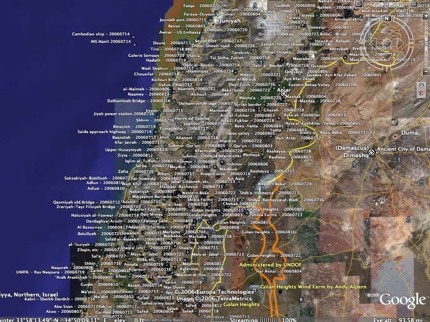I never met Lebanese journalist Hanady Salman, but I’ve been receiving her daily dispatches of reports and pix of Israeli war crimes in Lebanon since the war started, via Cairo-based journalist and friend Ranwa Yehia.
I didn’t post any of them before, but the reports she supplied always guided us to where to look for info. Issandr also uploaded many of the pix she sent to his flickr account. Hanady’s first hand account of the war on the ground has been extremely touching, sad, tragic, but also brave, relentless, with a strong spirit of resistance. The Lebanese people are blessed to have someone like Hanady, as her emails played a crucial role in the international solidarity movement, even when she’s stuck in Beirut. I hope I’ll get the chance to meet her one day in Beirut or Cairo… I’m sharing with you her dispatch today, which she said will be the last:
This would probably be my last letter to you.
I will miss you all. Some of you I never met, but I feel that you are all so close to me. More than that, you probably already know it: without you I would not have made it throughout this hell. You were there, by my side and that made me stronger. Everyday, you gave more meaning to all this: people’s stories were heard, people’s suffering was shared. This was what I could do to my people : tell some of their stories. Knowing that you will listen, knowing that you will care made the whole difference.
As of yesterday, new stories will unveil : those returning to find .. nothing. Those returning to find their loved ones under the rubble. But returning anyway. 7 a.m. (or 8 a.m.) was the official time for the cease fire on Monday morning. People were on the roads at 7 sharp. I am so proud. Sad, hurt, but proud. Proud of my people, proud of their resistance, proud of their commitment and dignity.
Hussein Ayoub, my colleague, finally found his mother today. Ten minutes ago actually. He went to Aynatha in the morning and the rescuers were able to pull her out of the rubble of a house where she, and some 17 other people had taken refuge. We don’t know when she was killed. But at least he was able to recognize her body. She was 75. His father was killed by the Israelis in 1972.
We will be fine, I hope. We will burry our dead, the way they deserve to be buried, we will remember them as long as we live. We will tell their stories to our children; they will tell their own children the story: the story of a great people, one that never lost faith despite all the crimes, pains and injustices.
One that started rebuilding the minute the fighting stopped. Rebuilding although they know that the enemy might destroy everything again, as it did so many times before.
We will also tell them the stories of our enemy : how they killed our children , our elderly , how they hit us from the air, from the sea and from the ground and how we prevailed. How they starved our families in their villages, killed them on the roads, bombed their houses, their shelters, their hospitals, they even bombed vans carrying bread to them; and how in return we did not give up.
My grandmother used to tell me how people starved during World War One. I used to think I would never have similar stories to tell Kinda. Kinda, my heroine , Kinda my sweet little heroine who now , every time she hears the sound of a plane, rushes to my arms , points to the sky and says : Israel , Hweiyda wa wa.
Kinda my baby who survived her first Israeli aggression. To that, I will always be grateful, and I promise I will never forget that other babies were not spared. For them, I will keep telling Kinda the story. For them, Kinda will never leave this land. Kinda will know who her enemy is. Kinda will know this enemy can not beat us. Kinda will grow to respect all the men who fought for her on the front lines, and those who will rebuild her country again.
Kinda will also grow to know how important you, all of you, were part of her life during a long painful month in the summer of the year 2006.
To those I knew through this list: I hope I will get to meet you one day. To all of you : thank you for your support , your encouraging messages, your prayers, and your feelings for Kinda.
My love and gratitude to all of you.
Hanady Salman
PS : later today I will send some pictures from the villages where people returned.




